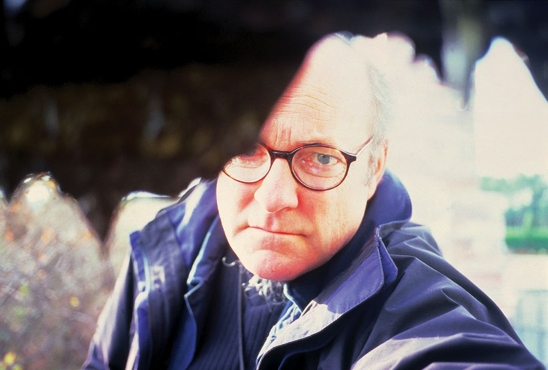Artist, photographer, writer, filmmaker, critic, and teacher Allan Sekula passed away on Saturday night, reports Sylvia Denlinger for the Examiner. Artforum: “While Sekula’s practice began in the 1970s with performances and installations among other media, he eventually became best known for a photographic oeuvre that investigated the politics of globalization and capitalism…. As a film and video artist, Sekula also often collaborated with theorist Noël Burch, making projects ranging including The Reagan Tapes (1984) and The Forgotten Space (2010).” The latter film won the Special Orrizonti Jury Prize at the 67th Venice Film Festival in 2010.
Talking with Sekula for the Guardian last year, Sukhdev Sandhu noted that The Forgotten Space “uses the statistic that 90% of cargoes today are carried by ship as its cue to develop a wide-ranging thesis about containerization, globalization and invisible labor. Seas are fascinating, Sekula argues, because of the counter-orthodoxies and refutations they offer to modern political thought. ‘In Alain Tanner’s Les Hommes Du Port, a documentary about dockworkers in Genoa, he says: “The time of the sea runs counter to the lie.” He doesn’t say what the lie is. But you know: it’s everything about neoliberalism. The sea is all about slow time—things move slowly, there’s a lot of waiting—and as such it contradicts all the mythologies of instantaneity perpetuated by electronic media.”
Thomas Lawson at East of Borneo: “As a writer, Allan described with great clarity and passion what photography can, and must do: document the facts of social relations while opening a more metaphoric space to allow viewers the idea that things could be different. And as a photographer he set out to do just that. He laid bare the ugliness of exploitation, but showed us the beauty of the ordinary; of ordinary, working people in ordinary, unremarkable places doing ordinary, everyday things. And, like the rigorous old-style leftist that he was, he infused that beauty with a deep sense of morality.”
Introducing an interview with Sekula for BOMB Magazine in 2005, Edward Dimendberg wrote that “Sekula’s generosity toward students and younger artists has done much to mitigate the crasser tendencies of the Los Angeles art world, just as his presence at local events inevitably instills debate and leaves me feeling less isolated and bereft of community; the eternal Los Angeles condition.”
Allan Sekula – Ship of Fools – interview by Grant Watson from M HKA
Just a few days ago, Blake Gopnik noted how glad he was to see photos from Sekula’s Fish Story series acquired by MoMA: “Sekula’s project, shot between 1988 and 1995, represents the informative, content-focused end of the spectrum of fine-art photography, so it’s great to see it find a home in a museum thought of (utterly unfairly) as the home of formalist Modernism…. Funny thing is, I remember that when I first saw Sekula’s images, years ago, they seemed utterly resistant to aesthetic concerns—they were just pure documentation of global trade and labor. Now they look like an established, familiar aesthetic.”
Update, 8/20: Matthew Flanagan‘s posted an extract from Sekula’s Fish Story as well as a collection of links.
Update, 8/21: Bits of Business on The Forgotten Space: “The film is unabashedly Marxist. The way in which this reflects in the film is that a deep concern for people, a profound humanism, battles back against the hulking, imposing testaments to the maintenance, continuation and renewal of capitalism.”
For news and tips throughout the day every day, follow @KeyframeDaily on Twitter and/or the RSS feed. Get Keyframe Daily in your inbox by signing in at fandor.com/daily.




